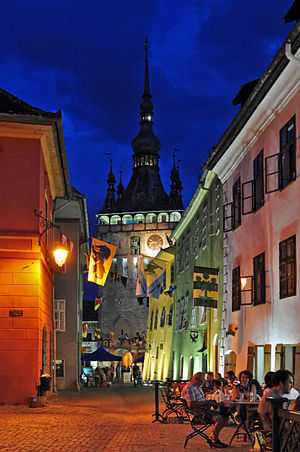Historic Centre of Sighișoara
| Historic Centre of Sighișoara | |
|---|---|
| Name as inscribed on the World Heritage List | |
 | |
| Type | Cultural |
| Criteria | iii, v |
| Reference | 902 |
| UNESCO region | Europe and North America |
| Inscription history | |
| Inscription | 1999 (23rd Session) |
The Historic Centre of Sighișoara (Sighișoara Citadel) is the old historic center of the town of Sighișoara (German: Schäßburg), Romania, built in the 12th century by Saxon colonists under the Latin name Castrum Sex. It is an inhabited medieval citadel that, in 1999, was designated a UNESCO World Heritage Site for its 850-year-old testament to the history and culture of the Transylvanian Saxons.
Birthplace of Vlad III the Impaler (in Romanian Vlad Țepeș), Sighișoara hosts, every year, a medieval festival where arts and crafts blend with rock music and stage plays. The city marks the upper boundary of the Land of Sachsen. Like its bigger brothers, Sibiu (Hermannstadt - The European Cultural Capital in 2007) and Braşov (Kronstadt), Sighișoara exhibits architecture typical of medieval Germany. During the Communist era, this German area was preserved, and the original architecture is still in place.
See also
External links
![]() Media related to Sighişoara at Wikimedia Commons
Media related to Sighişoara at Wikimedia Commons
| ||||||||||||||
Coordinates: 46°13′04″N 24°47′32″E / 46.21778°N 24.79222°E